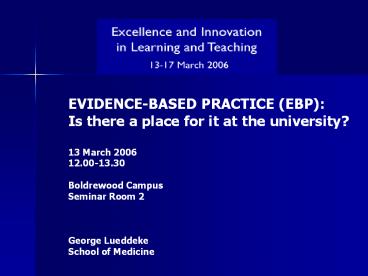EVIDENCE-BASED PRACTICE (EBP): - PowerPoint PPT Presentation
1 / 21
Title:
EVIDENCE-BASED PRACTICE (EBP):
Description:
Much of what we (and others) do in Higher Education (HE) remains unexamined and, ... Differentiated education support (postgrad/intern) ... – PowerPoint PPT presentation
Number of Views:1032
Avg rating:3.0/5.0
Title: EVIDENCE-BASED PRACTICE (EBP):
1
EVIDENCE-BASED PRACTICE (EBP) Is there a place
for it at the university? 13 March
2006 12.00-13.30 Boldrewood Campus Seminar Room
2 George Lueddeke School of Medicine
2
Session Overview
Welcome Background to study Rationale for
EBP Definition Research questions Method EBP
seminar series Consultations Findings
Application of EBP thinking Whats next?
3
Background
Secondment during 2005/06 Help build capacity
for evidence-based practice (EBP)
4
Rationale for EBP
Much of what we (and others) do in Higher
Education (HE) remains unexamined and, as a
consequence, we often do not know whether
practices or polices are sound or are meeting
expectations.
5
Practice or Policy Query
Take a moment to think about one practice or
policy that you feel could benefit from further
scrutiny (i.e., does it work?) in your School or
department.
6
Purpose of Study
To find out whether evidence-based approaches
to policy and practice (EBP) might be helpful in
realising University and school expectations.
7
Defining EBP
The research needs to draw on evidence from
world-wide research and literature on education.
A need to establish sound evidence, by
systematically collecting information about
particular phenomena. (Groundwater-Smith,
2000)
8
- Investigate
- how staff and students understand the meaning of
the term evidence-based practice - whether this type of approach could help schools
and the University to realise their mission and
goals - whether there are common institutional high
priority themes or educational issues that might
be amenable to the application of EBP - possible obstacles to carrying out this type of
research and ways of overcoming these at the
University and - how best to move forward, if there were
sufficient interest across the University.
9
Method
- A search and literature review to help identify
key concepts, issues and current practice. - Discussion with colleagues from the Universitys
Educational Development Network Group (EDNG). - 1. EBP Seminar Series
- 2. Consultations
- _______________________________________
- Grounded Theory Approach
10
1. EBP Seminar Series
Series aimed to encourage participants to
become more familiar with evidence-based
practice. Learning Teaching Coordinators
Associate Deans (Education) Others Share
experiences develop EBP projects 22 sessions
from March 05-Feb 06 (2 per month) c. 20-30
attendees most months C 15 projects
(http//www.clt.soton.ac.uk/edng)
11
2. Consultations
12
- UNDERSTANDING THE MEANING
- OF EBP
Most not connected EBP to education practice but
a few did It means critically evaluating our
current policies and questioning and evaluating
of all that we do.
13
2. EBPhelpful to University/ Schools/Depts?
- That depends but could help to
- identify what we should no longer do, what we
- should avoid doing in future and what we might
do. - ensure our programmes are fit for fees
- might be helpful in thinking differently and
doing - things differently.
14
3. Main Themes
Research and Teaching Curriculum Relevancy and
Delivery
15
4. Barriers
Lack of time and resources but Making a
mindshift and deciding on where we place our
values. ?
16
Applying EBP Thinking
- Here are 3 key issues emerging from this years
Annual Operating Statements (AOSs) - Assume that a working party has been set up. What
research questions (1-2) might be asked to ensure
that an initiative will be underpinned by EBP
principles? - Group A
- Staff development linked to the drive to
continue to enhance the learning experience at UG
and PG level. (LASS) - Group B
- Formal examinations tend to be detached from the
rest of the student learning experience. (MHLS) - Group C
- While UoS students are keen to go to Penn State
U, not enough PSU want to come to study at UoS.
(FEMS)
17
- Translating Aspirations into Reality
- EBP features prominently at the beginning and at
the end of the process and provides the evidence
that change agents, managers and committees use
to accomplish change. - Change might best be accomplished by
- evaluating the current situation to decide what
needs to be changed, including potential risks
and - creating the conditions for change.
- (Jackson 2004)
18
5. Next steps in progressing EBP?
Is there a place for wider adoption of EBP
principles and practices at the University?
If so, how might the University/Schools
proceed?
19
Not so final words
the more open we are about sharing evidence,
the more likely that multiple perspectives will
be brought to bear on interpreting and analysing
what the evidence means, and the less likely it
is that the evidence will be constrained by a
limited set of agendas. (Borden 2004)
20
One of the most powerful outcomes of such
research is the development of ways of thinking
about educational issues and the development of
language to discuss such issues within particular
contexts. (Prosser 2005)
21
ANNEX Other academic issues
- Gap between theory and practice
- Learning Outcomes
- Student literacy
- Differentiated education support
(postgrad/intern) - Diversity agenda and integrating relevant aspects
into the curricula and teaching practices - Academic/academic support partnerships
- Networking
- Active learning (small group)
- Flexible delivery
- Professionalising practice
- Incentives for teaching excellence scholarship































![[PDF] Research for Advanced Practice Nurses, Second Edition: From Evidence to Practice 2nd Edition Kindle PowerPoint PPT Presentation](https://s3.amazonaws.com/images.powershow.com/10096647.th0.jpg?_=20240812097)